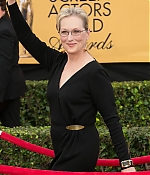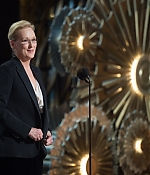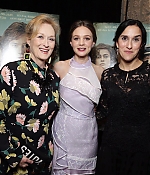|
Simply Streep is your premiere source on Meryl Streep's work on film, television and in the theatre - a career that has won her the praise to be one of the world's greatest working actresses. Created in 1999, we have built an extensive collection to discover Miss Streep's body of work through articles, photos and videos. Enjoy your stay.
|
Celebrating
25 years
of SimplyStreep
|

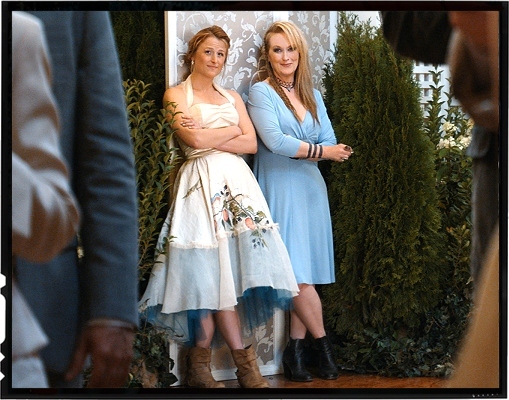
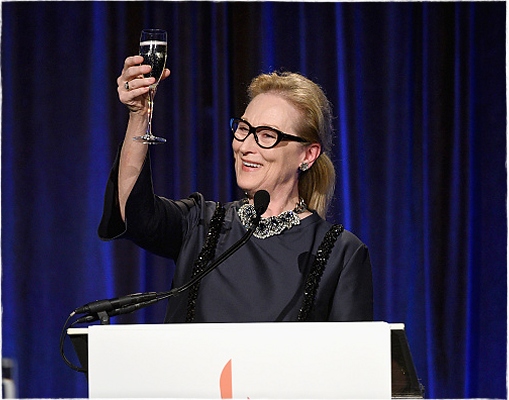
In 2015, Streep starred in Jonathan Demme’s “Ricki and the Flash”, playing a grocery store checkout worker by day who is a rock musician at night, and who has one last chance to reconnect with her estranged family. The film was written by Diablo Cody, who won an Academy Award for writing “Juno”, and who says her inspiration for the character Ricki came from her own life. “My husband’s mom is actually the lead singer of a cover band on the Jersey Shore,” Cody tells NPR’s Rachel Martin. “And the thing that was striking to me when I met her was nobody had prepped me for that — so I was expecting to meet your typical mother-in-law, and then that night we go to see a show of hers, and she’s standing on the bar singing.” That was the spark for the character at the center of the film, Ricki Rendazzo, played by Streep. Ricki lives in LA, estranged from her three kids, who live in Indiana. At its core, this film is about family. To pursue her dream, Ricki left her husband and children behind; a family crisis finally takes her home, where her daughter is struggling with her own divorce. Streep learned to play the guitar for the semi-autobiographical dramedy film, which reunited her with her eldest daughter Mamie Gummer. Reviews of the film were generally mixed but favorable. The New Yorker wrote: “Demme is unrivalled at filming bands at play – and at noticing the folks who listen and dance along – and Streep’s part is worthy of her formidable gifts. Her singing has an edge of urgency to it, and a secure hold on the emotional form of the movie. The happy ending, for once, feels thoroughly earned.”
Streep’s other film of the year was director Sarah Gavron’s period drama “Suffragette”. The drama tells the story of the militant campaign in support of women’s voting rights in the UK, and features Carey Mulligan as a laundress called Maud Watts, a fictional working-class character whose struggle is the centre of the drama. “Suffragette” also features Helena Bonham Carter as Edith Ellyn, an amalgamation of more than one prominent suffragette, and Natalie Press as Emily Davison, the activist who died at the 1913 Epsom Derby. Streep plays the small but pivotal role of Emmeline Pankhurst, a British political activist and leader of the British suffragette movement who helped women win the right to vote. Pankhurst founded the Women’s Social and Political Union, which used militant tactics to agitate for women’s suffrage. She was imprisoned many times, but supported the war effort after World War I broke out. Parliament granted British women limited suffrage in 1918. Pankhurst died before women were given full voting rights.
Men should look at the world as if something is wrong when their voices predominate. They should feel it. People at agencies and studios, including the parent boards, might look around the table at the decision-making level and feel something is wrong if half their participants are not women. Because our tastes are different, what we value is different. Not better, different. (Meryl Streep, Time Out, September 28, 2015)
In accordance with its powerful themes of gender struggle, empowerment and solidarity, the production has also made much of its female-dominated creative team, led by director Sarah Gavron and scriptwriter Abbie Morgan, whose film work includes “The Iron Lady”, “Shame” and “The Invisible Woman”. Gavron said that the cast and crew had formed “an immediate bond”. “There was an unusual sense of camaraderie, partly it was because we were telling a story everybody felt very passionate about, but also because there was an unusual balance: we had men, and we had women, in key positions, and that was exciting,” Gavron said during the film’s world premiere at the London Film Fesitval. The film-makers explained their decision to focus on a peripheral figure in the suffragette struggle, and a fictional one at that. During the press conference, Streep said: “The great achievement of the film is that it’s not about women of a certain class; it’s about a working girl, a young laundress, who looks like us, and the circumstances of her life were out of her hands, completely.” Mulligan, whose character joins the suffragettes’ campaign after years of toil in a laundry, suggested that this focus meant that it was more relevant to contemporary audiences than a straight historical biopic. “It doesn’t feel like a documentary about the past, it feels like a film about today. I always felt it’s resonance was about where we are now, and its achievement is to mark what these women did, and what they gave to us. Of course, we still live in a sexist society, but the film allows us to look at where we are today.” The film received mostly positive reviews and grossed $38 million against a budget of $14 million. It didn’t become an awards player as expected, and, ironically, the only acting award it received was for one of the very few men in the film, Brendan Gleeson, who won Best Supporting Actor at the British Independent Film Awards.
Besides her steady work in film, Streep was active in the causes close to her heart. In April 2015, it was announced that Streep had funded a screenwriters lab for female screenwriters over forty years old, called the Writers Lab, to be run by New York Women in Film & Television and the collective IRIS. As of the announcement, the Writers Lab is the only initiative in the world for female screenwriters over forty years old. She also became a spokesperson for the National Women’s History Museum, after President and CEO Joan Wages wrote her a letter. “She is immensely kind and thoughtful,” Wages said. “She just gets the importance of a museum like this that will honor women and show that they have contributed to the building of this nation in ways that they have not, to this date, been given credit.” Meryl hosted the museum’s “The de Pizan Honors” gala in 2009, where, each year, NWHM pays tribute posthumously to selected women with an award in their name presented to a contemporary counterpart. At the event, Streep donated $1 million to the cause. She has also participated in numerous high profile events for the Museum, including “Shine On” at Radio City Music Hall for two consecutive years.



